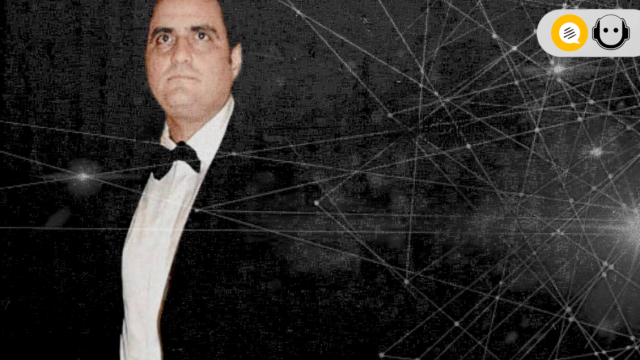
Once it was known the Colombian businessman made a deal with the DEA in 2018, the regime’s social media accounts started reacting to the plot twist.
By Caracas Chronicles
Feb 23, 2022
When we began our alliance with Probox, we looked for tools to understand the dynamics of our social media ecosystem, in order to know who is shaping conversations, and why exactly are they relevant. In October 2021, we talked about how chavismo turned Alex Saab into a Twitter martyr. Back then, the government used an enormous amount of budget and time to promote Saab as a Venezuelan diplomat (after he was arrested in Cape Verde in June 2020) and frame his detention as arbitrary political imprisonment. Chavismo used seven different narratives on social media:
- Victimization: highlighting Saab’s “eagerness to help the people” and his status as a “diplomat”. This includes a series about Saab on YouTube and the creation of the Free Álex Saab Foundation.
- Negotiating table in México: the second most used narrative, which calls for Saab to be included in the negotiation and affirms that the negotiation with the opposition will only be resumed if he is released.
- Misinformation: about the case and the processes around it, with 15 trends and more than 400,000 messages.
- Targeting Cape Verdean officials: mainly against the Prime Minister and the Attorney General with 13 trending topics. This was the narrative with the highest average number of messages generated by possibly automated accounts (62.22%).
- Attack on journalists who have exposed the case: mainly against ArmandoInfo’s Roberto Deniz, with three trends that accumulate around 54,200 messages.
- Defense of Julian Assange: three trends that demand the release of the WikiLeaks founder, comparing his case with Saab’s and using it as an example of “kidnappings by the United States.”
- Propaganda and commercial matters: about businesses allegedly linked to Saab, three trends promoted by anonymous users that are dedicated to defaming, attacking and propagandizing about some relevant issues in the country.
Whenever a piece of news is published about Saab, he is involved in every relevant conversation on social media. But no one is as dedicated and systematic about Saab’s defense as officials and government entities. Hashtags related to Saab are incredibly repetitive. We see trending hashtags about him every single day. #AlexNosUnióMás, #AlexPresoPolítico, and #AlexEsDiálogo have all been promoted by high-ranking chavista political actors. However, they also show more than 55% of inorganic promotion.
Last week a huge plot twist came to light: new revelations indicate that he was an informant for the DEA, a blow against the narrative of him being a diplomat. Washington, for its part, considers Saab a key player in unraveling corruption inside the Venezuelan government.
The Change in the Narrative
Now, chavismo seems to be studying the situation, using new hashtags, and adding a new narrative: everything is a lie. Still, there are some relevant incoherences regarding their messages behind this narrative
- Camilla Fabri, Saab’s wife, denied the U.S. information that her partner was a collaborator with the DEA.
- One of Saab’s lawyers, David B. Rivkin – associated with the Baker & Hostetler LLP law firm – published a statement in which Saab insists that he is faithful to Maduro although he admits that he met with the U.S. Department of Justice.
- The Deputy Minister of Anti-Blockade Policies, William Castillo, argued that they question the information revealed, because if Saab was a collaborator with the U.S. justice system, he would not have been subjected to more than a year in prison in Cape Verde, nor to the alleged torture that his defense has denounced.
- Jorge Rodríguez, the president of the National Assembly, offered a press conference where he avoided referring to the issue, but questioned the prosecutors’ revelations: “If so, why did they knock out two teeth by beating him in Cape Verde, why was he tortured, why are they keeping him in inhumane conditions in a cell, why subject him to psychological terrorism? Why? It’s weird, isn’t it?” he questioned.
Let’s dig deeper into how it went on social media:
- On average, radical chavismo positions a daily trend in favor of Alex Saab.
- On February 16th, the news of the alleged cooperation of Saab with the DEA broke out. The ruling party was promoting #FreeAlexSaab and, when the link with the DEA became known, they began to promote #MentirasYankees as a response. At least 51.75% of these messages were made by possible automated accounts.
- On February 19th, after two days of discreet activity, they once again positioned a trend in favor of Saab, #FreeAlexSaab (56.43% inorganic). This trend referred to a meeting between the Free Álex Saab Foundation and leaders of the Union of Young Communists of Cuba, so it was a trend in Cuba too.
- On February 20th, they promoted a trend in favor of Saab again, #EEUUMienteSiempre, maintaining the narrative that all of Saab’s communications with U.S. agents were carried out with the knowledge and support of the Venezuelan regime, and that the new revelations are “a defamation campaign.” At least 67.10% of the tweets were made by possible bots.
- On February 16th and 17th, #AlexSaab was a trend positioned by various actors with news and opinions around the announcement of cooperation with the DEA. This trend generated around 15,421 messages altogether; on average, at least 96.34% of their messages were made by real users, contrasting dramatically with the behavior of trends about Saab promoted by radical chavismo.
- However, since the new revelations came to light, the average of interaction rose, with 13.89% more possibly automated accounts per trend.
…
Read More: Caracas Chronicles – Chavismo changed its narrative on Alex Saab
…